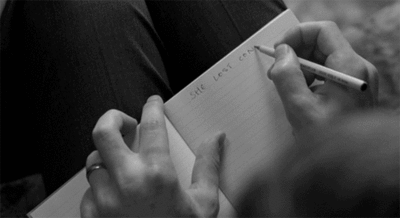The Query Process – Part Two

I’ve already addressed this HERE but there was a discussion about querying over on the The Lucky 13′s message boards and the advice was stellar — so I figured I’d pass it along to you.
If you are interested in publishing in any respect (fiction, non-fiction, etc.) you’ll need to craft a kick-ass query letter. The query letter is your first impression. It’s your chance to wow a potential agent.
I was never all that worried about querying. Looking back, it’s probably why I got so many rejections  . And, of course, I wish I’d had all of the advice I’m about to give you!
. And, of course, I wish I’d had all of the advice I’m about to give you!
Without further ado, with credit to the authors who have provided it, here are some tips. Click on the titles of their books to read more about them (and, of course, buy the book if you are so inclined.)

Demitria Lunetta, Author of IN THE AFTER
“Writing a query is harder than people think. I would stress that it’s so important to take your time to get it right. Don’t bang it out in an afternoon. Read other people’s query’s. Write a draft, then revise, revise, revise. If you have a bad query, no one will ever look at your awesome MS.”
Karen Akins, Author of LOOP
“I found Elana Johnson’s ebook “From The Query To The Call” very helpful. She gives good, actual examples of queries that worked & WHY they worked. and she also talks about navigating “the call.” She was charging a nominal fee back in the day, but it might be free now.
Also, I never put the agent’s email address into the “To:” line until I was absolutely sure I was ready to send it. Just in case Gmail (or my brain) glitched.”
Rachele Alpine, author of CANARY
“This comes before the query, but when I was looking for agents, I used the back of books I loved and the author’s acknowledgements to find out who their agents were. I queried agents of authors that I really liked, because they had similar taste as me. There are so many agents that it can be hard to decide who to query and who is the right fit for you, so this was a good way for me to start looking.”
Cristin Terrill, author of ALL OUR YESTERDAYS
“Have a dedicated email address for querying (that sounds professional, not like your AIM screen name from high school) and give yourself set times a day to check it, or set up a rule in your mailbox to divert any query responses to a specific folder. That way you won’t jump every time your email dings.
Query in batches and save your top picks for a later batch in case you discover something in your query isn’t working.
Make super, super sure you follow the agent’s querying instructions exactly. I used a spreadsheet to make sure I was getting it right as well as tracking responses.”
Stephanie Kuehn, author of CHARM & STRANGE
“I had one question that no one could really answer for me, so ultimately I answered for it myself: if you need to spoil the ending to your book to get across why the book is an interesting one, then spoil it. (as in, imagine you’re pitching The Sixth Sense to agents: tell them the twist…that’s what’s compelling.)”
Chelsea Pitcher, author of THE S-WORD
“1. Test out your query on readers/writers. Evil Editor is my favorite site, because it’s like Query Shark, except he critiques EVERY query.
2. Don’t send “practice queries” to agents you don’t really want (or who aren’t near the top of your list), because what if they offer, and then you don’t have time to query the ones you really want?
3. NEVER OFFER EXCLUSIVITY (unless you feel you absolutely have to). Most agents don’t require exclusivity anymore, or actively speak against it, but for those who request it, they’re generally more than willing to waive it if other agents are reading the MS.
4. The best time to inform interested agents that others are reading your full is when you are sending a full to them.
5. If you get an offer of rep, email everyone who’s reading a partial/full and let them know. Generally you give them a week to respond and then make your decision.
6. I like to tailor my query to each agent, if they have specific likes: i.e., some like to know why you’re querying them, some would prefer you get right down to business. And, say I had a MS that walked the line between urban fantasy and paranormal romance, I’d choose which genre to use in my query based on the agent’s preference.
7. Do not just pay attention to what an agent reps. Pay attention to what an agent’s SOLD. We may be artists, but this a business, and you don’t want to find out your dream agent, who you super click with, is unable to sell your type of MS or just mass-submits to editors hoping something will stick.
8. This might sound a little crazy, but if somebody offers and you don’t have a great feeling about them (and maybe you have some info to back that up, like mediocre sales, or unhappy clients who left the agent), you don’t HAVE to sign with them. Listen to your gut. (And maybe have some info to back that gut-feeling up)
9. There are things about the querying process that you can’t control. Focus on the things you CAN: writing, rewriting, and RE-rewriting that query, getting feedback, and doing lots of research about agents. The rest is up the Query Fairy.”
Amie Kaufman, author of THESE BROKEN STARS
“Another huuuuge vote for From The Query To The Call. I completely learned to write pitches from that thing.
I would also add: DON’T PANIC. I accidentally sent a query to one of my dream agents attaching — I don’t even remember. 20 pages instead of 50, or forgetting to attach, or something. My heart totally stopped right after I hit sent, when I realised. But here’s the thing — I followed up with a quick ‘oops, sorry!’ email and it made absolutely no difference. When querying it can feel like everything’s life or death, but it’s really not.
Further: Be courteous when turning down agents, if you have more than one offer, and be equally courteous if you withdraw queries from those who haven’t yet responded, once you’ve accepted representation. I can tell you from personal experience that you never know when you’re going to end up dealing with them in some other capacity, and it’s always nice to have been nice, when that happens!”
Lydia Kang, author of CONTROL
“Leave these things OUT of your query:
1. This is the first novel you’ve written, or tried to query
2. Why your novel is going to make the agent big bucks
3. Why your novel would make a great movie
4. A very long bio.
5. Your history of self-pubbed novels, unless they’ve sold a lot of copies (I can’t remember the number on this, but I think it’s 20K or 25K copies in 6 months?)
6. Demands of any sort.
Things to include:
1. A pitch thats no longer than 400 words. I think 250-300 is the sweet spot (but that’s negotiable).
2. Writing relevant bio stuff (member of SCBWI, or RWA)
3. Thankfulness for their time and consideration.
4. The agent’s properly spelled name. No “To whom it may concern” or “Dear Agent”
Oh! Also, check your spam folder once in a while. I had a few full requests in my spam folder!”

As you can see, these are GREAT tips. To expand on what was highlighted above, here are some links to help you out.
The book, FROM THE QUERY TO THE CALL by author Elana Johnson was mentioned by more than one author above. Click on the title for a free download of the e-book.
QUERY SHARK and EVIL EDITOR are the blogs Chelsea Pitcher mentioned that critique queries. They show you the good and the bad, so it’s worth a look to see what the difference is.
My agent, SUZIE TOWNSEND, has a fantastic blog that looks at successful queries, the submission process, and a ba-jillion other topics of interest in publishing.
More questions? Leave them in the comments below!
*ALL GIFS COURTESY OF GIFY.COM*



